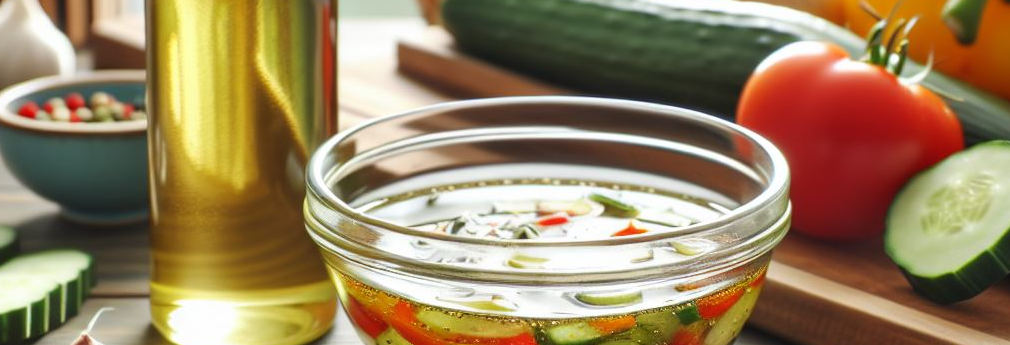
A food manufacturing company specializing in ready-to-eat meals approached us with the goal of developing a vegetable oil-based marinade. The marinade needed to enhance the flavor and tenderness of various proteins, including chicken, fish, and vegetables, while being shelf-stable for extended periods. The client sought a formulation that would not only improve taste but also maintain the moisture content of the food during cooking, ensuring consistent results across different protein types. Additionally, the marinade was expected to cater to health-conscious consumers by using healthy vegetable oils and minimizing artificial additives.
Objective:
The objective was to develop a versatile vegetable oil-based marinade with the following characteristics:
- Flavor Enhancement: The marinade needed to add depth of flavor to proteins without overpowering the natural taste of the food.
- Moisture Retention: The marinade should help retain moisture in proteins during cooking, preventing them from drying out.
- Extended Shelf Life: The marinade had to be shelf-stable for at least 6 months without refrigeration.
- Clean Label: The marinade had to appeal to health-conscious consumers, using vegetable oil, natural ingredients, and minimal artificial preservatives.
- Versatility: It had to be suitable for use on various proteins such as chicken, fish, and vegetables.
Challenges:
- Flavor Stability: Ensuring that the flavor profile of the marinade remained consistent over the product’s shelf life.
- Oil Separation: Preventing the vegetable oil from separating from the other ingredients over time, which would affect the product’s appearance and usability.
- Moisture Retention: Developing a marinade that could maintain the moisture content of proteins during grilling, roasting, or baking.
- Preservation: Achieving an extended shelf life without the use of synthetic preservatives.
- Emulsification: Ensuring a stable emulsion between the oil and water-based ingredients without artificial emulsifiers.
Solution & Formulation by Food Research Lab:
- Oil Selection:
- We chose extra virgin olive oil as the primary base for its rich flavor and health benefits. It’s high in monounsaturated fats, making it a heart-healthy option.
- A secondary oil, canola oil, was included to balance the cost and ensure a mild flavor profile. Canola oil also has a higher smoke point, which was important for high heat cooking methods like grilling.
- The ratio of olive oil to canola oil was optimized to achieve the right balance between flavor and functionality.
- Flavor Enhancers:
- Herbs and Spices: Fresh and dried herbs were incorporated for a robust Mediterranean flavor. These ingredients also act as natural antioxidants, helping to preserve the oil and prevent rancidity.
- Acidity: We added natural products to create a tangy balance to the oil’s richness. These acidic components not only enhanced flavor but also helped tenderize the protein.
- Sweetness: A small amount of natural sweetner was introduced to balance the acidity and add complexity to the marinade’s flavor profile. Honey also aids in caramelization during cooking, enhancing the appearance and texture of the food.
- Moisture Retention:
- We used natural enzymes to help break down proteins, allowing the marinade to penetrate deeper into the food and retain moisture during cooking. The salt also acted as a natural preservative.
- A natural emulsifier to maintain a stable emulsion between the oil and water-based ingredients, preventing separation over time.
- Preservation and Shelf Stability:
- We recommend various natural preservative due to its strong antioxidant properties. It helped in delaying the oxidation of the oils and extended the shelf life of the marinade.
- Packaging: We recommended packaging the marinade to protect it from light and prevent oxidative rancidity, which would compromise both flavor and shelf life.
- Testing & Adjustments:
- Several trial batches were produced to test the balance of flavors, ensuring that the marinade worked equally well across different proteins.
- The marinade underwent stability testing, where it was stored at various temperatures to simulate different storage conditions. We monitored for changes in flavor, texture, and microbial growth over a 6-month period.
Implementation:
The formulation was finalized after several rounds of sensory and stability testing. The final marinade was a rich, flavorful blend of extra virgin olive oil, canola oil, natural herbs, spices, and acid-based flavorings that provided excellent results across various proteins. The marinade was produced in a commercial kitchen using high-shear mixers to ensure the proper emulsification of oil and water-based ingredients.
Outcome:
- Flavor & Versatility: The marinade successfully enhanced the flavor of proteins while maintaining their natural taste. It was praised for its versatility, working equally well on chicken, fish, and vegetables. Customers appreciated the balance of richness from the olive oil and the tanginess from the vinegar and lemon juice.
- Moisture Retention: Proteins marinated with this formulation retained their moisture during cooking, resulting in tender and juicy meals. The natural tenderizers and salt helped the marinade penetrate deep into the food, ensuring an even distribution of flavor and moisture retention.
- Shelf Stability: The final product achieved a shelf life of 6 months without refrigeration, thanks to the natural antioxidants, emulsifiers, and proper packaging.
- Consumer Appeal: The product appealed to health-conscious consumers, as it was made from 100% natural ingredients with no artificial preservatives or additives. The use of extra virgin olive oil added to the product’s perception as a premium marinade.
- Cost Efficiency: The blend of olive oil and canola oil made the product affordable to produce while maintaining a high-quality perception.
Conclusion
The vegetable oil-based marinade formulation developed for the client successfully met the objectives of enhancing flavor, retaining moisture, and providing extended shelf life without artificial preservatives. By using a combination of natural ingredients and emulsification techniques, FRL was able to deliver a premium-quality marinade that catered to both health-conscious consumers and food manufacturers looking for a shelf-stable product.





